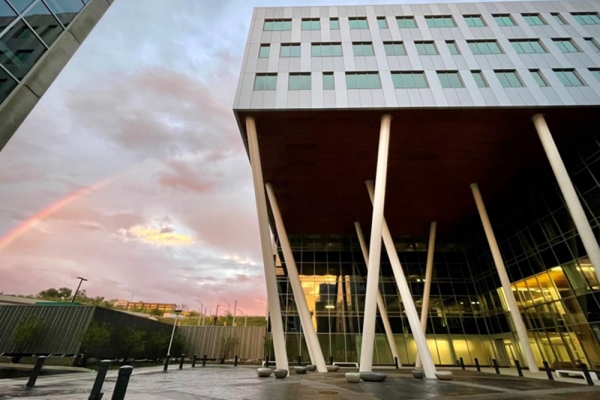A $500,000 investment from a venture capital fund supporting companies operated by minorities and people of color will help advance Anthony Chang’s vision for a network of advanced cancer treatment clinics across the U.S.
BAMF Health Inc., which Chang started in 2018 and leads as CEO, recently received the first investment made by the New Community Transformation Fund.
Part of a $30 million Series B capital round that BAMF Health is “pretty close” to finalizing, the investment will go to open the Radiopharmacy, Imaging and Theranostics Clinic this summer in downtown Grand Rapids. The funding will also help continue research and development to advance the clinic’s technology, and to begin preparation for a second, smaller clinic at Loma Linda University in California that Chang wants to open later this year.
A former Van Andel Institute researcher who came to the U.S. from Taiwan 20 years ago, Chang envisions opening 30 to 50 clinics across the country over the next three to five years.
“We’re building a nationwide network to make this technology accessible and affordable to the patients,” Chang said. “Grand Rapids will be our flagship site and it will be our very first site in the nation, but we’re going to actually build a whole network around the nation because one site will never be able to fulfill the need.”
First investment
The BAMF Health investment comes two years after organizers formed the New Community Transformation Fund to support entrepreneurs of color and create greater diversity and inclusion in West Michigan’s economy.
Birgit Klohs, who chairs the New Community Transformation Fund board, conceived the venture capital fund idea in 2018 while she was CEO of The Right Place Inc. She assembled a team to create the fund in early 2020.
Through the investment in BAMF Health, the fund has met three key milestones that organizers sought to achieve by early 2022: Hiring a managing director, hitting a $10 million fundraising threshold to begin investing, and closing its first deal.
“We’re on the right track,” Klohs said. “It was a dream and it was an idea. To get here makes me incredibly proud — pride in an accomplishment and pride in something the community needs.”
The Grand Rapids-based venture capital fund invests $250,000 to $500,000 in second-stage, minority-owned companies in advanced manufacturing, food and agribusiness, e-commerce and information technology, life sciences, and financial technology. The fund will also back minorities and entrepreneurs of color who are buying companies going through an ownership transition. Investments will go to local businesses and those based outside of the region who are willing to relocate to West Michigan.
‘Strong pipeline’
BAMF Health was chosen for the venture fund’s first deal out of 1,000 prospects, 30 of which met investment criteria and went to due diligence, said Ollie Howie, the managing director for the New Community Transformation Fund who was hired last fall.
The 30 companies that went forward to due diligence are “very much still active and live” for consideration of an investment, Howie said.
“We’re taking those final steps with the (other prospects) after qualifying that they could be a part of the fund,” he said. “It’s a strong pipeline.”
The New Community Transformation Fund’s Investment Committee has approved a second deal involving an outside financial technology firm that would move to the Grand Rapids area, “and then we have 29 more that we’re doing deep work on,” Howie said.
He expects the New Community Transformation Fund to make five to eight investments in 2022, and complete the bulk of its investing over two years.
Organizers proceeded with the investment in BAMF Health after reaching $10 million late last year toward a $25 million fundraising goal. The fundraising continues to seek additional support, while “a number of conversations are ongoing” with prospective investors, Howie said.
“We have a lot of asks outstanding,” he said. “We’re marching ahead to our goal of $25 million.”
Closing the first investment could give momentum to the fundraising work. The investment gives present and prospective investors more visibility and allows them “to see where their dollars will ultimately go to work,” Howie said.
“We’re excited about shifting that narrative from us as a fund that’s up and coming to one that’s actually established, making investments, and we can point to our portfolio companies and the way that they’re changing the world. Hopefully that can give us some momentum in fundraising,” he said.
The New Community Transformation Fund will seek to co-invest in companies with other venture capital funds and angel investment groups, Howie added.
In BAMF Health, the New Community Transformation Fund invested in a company that has a medical technology to identify and treat cancer and potentially other diseases such as Parkinson’s and Alzheimer’s at their early stages.
Its investment in BAMF Health fits with the fund’s theme to invest in “game-changing entrepreneurs creating world-changing systems and companies,” Howie said.
BAMF Health — short for Bold Advanced Medical Future — plans to open its clinic in mid-2022 in the Doug Meijer Medical Innovation Building on Michigan State University’s Grand Rapids Innovation Park research campus to provide an advanced cancer treatment using radiopharmaceuticals for molecular imaging and artificial intelligence.
In November, BAMF Health received a $3 million investment from tribally owned Waséyabek Development Co. LLC, the non-gaming economic development arm of the Nottawaseppi Huron Band of the Potawatomi.
BAMF Health’s technology enables the earlier detection of cancer, neurological and cardiovascular diseases, and other illnesses, as well as helping to better target a treatment that’s precise and customized to an individual patient.
“This is not just starting a company. This is a mission,” Chang said. “We’re here to make a solid foundation that allows us to bring the latest technology to the patients as soon as possible and that is accessible and affordable, so we can make a very big impact to human health for the coming 20 or 50 years.”
Credit: Source link


Comments are closed.